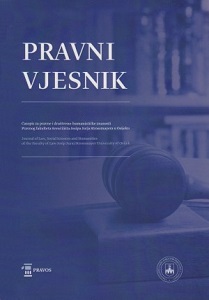UTJECAJ ODLUKA I NAČELA EUROPSKOG SUDA ZA LJUDSKA PRAVA NA UREĐENJE INSTITUTA POSEBNIH DOKAZNIH RADNJI U UJEDINJENOJ KRALJEVINI S POSEBNIM NAGLASKOM NA PRESRETANJE KOMUNIKACIJA
THE IMPACT OF THE DECISIONS AND PRINCIPLES OF THE EUROPEAN COURT OF HUMAN RIGHTS ON THE REGULATION OF THE INSTITUTE OF SPECIAL EVIDENTIARY ACTIONS IN THE UNITED KINGDOM WITH SPECIAL EMPHASIS ON THE INTERCEPTION OF COMMUNICATIONS
Author(s): Nevena AljinovićSubject(s): Media studies, Criminal Law, International Law, Human Rights and Humanitarian Law, Public Law, ICT Information and Communications Technologies
Published by: Pravni fakultet Sveučilišta Josipa Jurja Strossmayera u Osijeku
Keywords: special evidentiary actions; ECtHR; ECHR; right to protection of private and family life; RIPA; IPA;
Summary/Abstract: In the United Kingdom, the regulatory mechanism for intercepting communications has undergone substantial changes in the last few decades. Until the European Court of Human Rights (ECtHR) judgment in the Malone case (1984), in which it found a violation of the right to protection of private and family life pursuant to Art. 8 of the European Convention for the Protection of Fundamental Rights and Freedoms (ECHR), the United Kingdom did not have a concise legislative framework governing the interception of communications. Legislative frameworks governing the subject matter have also been changed by the standards set by the practice of the ECtHR. The implementation of the ECHR into the British legal system has imposed higher privacy protection standards as guaranteed by Art. 8 ECHR, in an environment where the common law approach that “the police can do whatever they want as long as it is not prohibited by law” was no longer sustainable. The specific feature of the legislative regulation of special evidentiary actions in the United Kingdom is manifested, for some special evidentiary actions, through the absence of judicial control, at least in the phase of issuing and extending orders for their implementation. Today, the area in question is governed by a special Regulation of Investigatory Powers Act 2000 (RIPA), Investigatory Powers Act 2016 (IPA), and related Codes of Practice, however not by the Criminal Procedure Code, as is the case in the countries with a continental legal tradition. In this paper, the author analyses the legislative changes that preceded the enactment of the Regulation of Investigatory Powers Act 2000, as well as the new Investigatory Powers Act 2016 that be described as the biggest reform of British interception regulation, as it has, for the first time in the UK, incorporated a judicial element for the power to interception. In this context, the question arises as to whether recent legislative changes meet the standards as established by the ECtHR. Consequently, conclusions are presented concerning the revised concept of the subject matter.
- Issue Year: 38/2022
- Issue No: 2
- Page Range: 75-95
- Page Count: 21
- Language: Croatian

